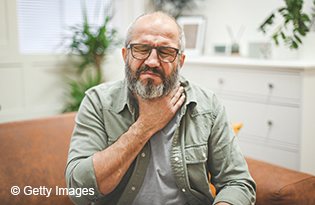GERD: 10 lifestyle changes to reverse reflux
12/14/2023 by Matthew Heinrich, M.D., M.B.A.

Gastroesophageal reflux disease (GERD), commonly known as heartburn or reflux, occurs when stomach acid repeatedly flows backward into the esophagus, the tube connecting the mouth and stomach. Over time, this backwash can irritate the linking of the esophagus resulting in symptoms.
Symptoms of GERD include:
- Burning sensation in the chest (heartburn).
- Upper abdominal pain or chest pain.
- Regurgitation of food or stomach acid into the mouth.
- Persistent cough.
- Difficulty swallowing.
 Many people with GERD can reduce their symptoms without prescription medications or invasive procedures. Here are 10 ways you can reverse the reflux.
Many people with GERD can reduce their symptoms without prescription medications or invasive procedures. Here are 10 ways you can reverse the reflux.
Maintain a healthy weight: Obesity puts extra pressure on the stomach, forcing stomach acid into the esophagus. Weight loss is the best way to reduce reflux.
Wear loose clothes: Tight clothing, like belts and waistbands, also increase pressure in the abdomen, causing heartburn.
Eat smaller, frequent meals: Large meals overfill the stomach, increasing the chance of reflux.
Stay upright after eating: Sitting up or standing after meals allows gravity to help food pass through the stomach, preventing backflow into the esophagus. Wait at least 2 hours before lying down.
Avoid trigger foods: Certain foods make heartburn worse, especially spicy and fatty foods, tomatoes, citrus juices, coffee, soda, chocolate and alcoholic drinks.
Quit smoking: Nicotine causes the lower esophagus to relax and also stimulates the production of stomach acid.
No bedtime snacks: Eating before bed can cause heartburn at night and interrupt sleep.
Elevate your head at night: Raising the head of your bed with bed blocks allows gravity to keep stomach acid from backing into the esophagus. Extra pillows usually are not enough.
Try an antacid: Taking an over-the-counter antacid 30 to 60 minutes after meals or at bedtime can temporarily reduce reflux symptoms.
Relax: Stress can increase our awareness of reflux symptoms and promote overeating. Relaxation techniques such as structured breathing, yoga and meditation can be helpful.
Incorporating one or more of these tips into your daily routine can provide significant relief from GERD symptoms. If your symptoms fail to improve or worsen, visit with your care team to discuss whether additional treatment or testing is necessary.
Matthew Heinrich, M.D., M.B.A., is an internal medicine physician in Community Internal Medicine, Geriatrics and Palliative Care and practices in the Baldwin building in Rochester, Minn. He earned his medical degree at Texas Tech University Health Sciences Center School of Medicine in Lubbock, Texas. His interests include primary care, evidence-based medicine and care of LGBTQIA+ patients.
